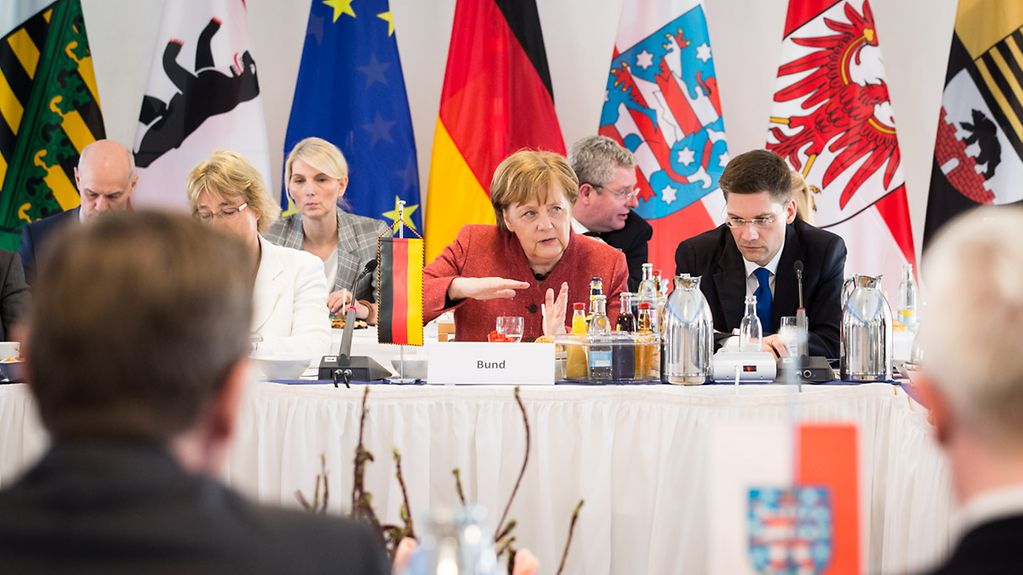Meeting of state premiers of Eastern states
Comparable living conditions, mobile coverage, broadband expansion and the future assistance from EU structural funds – these were the main focuses of the meeting between the Chancellor and the state premiers of the East German federal states.
4 min reading time

The goal is to achieve comparable living conditions - Angela Merkel during a meeting with the state premiers of the Eastern federal states
Photo: Bundesregierung/Steins
The new federal states in the East have seen unbelievable development efforts, which are perhaps not always understood in the West, said the Chancellor following the meeting in Thuringia. This must be recognised and praised, particularly in the period between the 30th anniversary of the fall of the Berlin Wall and the 30th anniversary of reunification.
This November, Germany will celebrate the 30th anniversary of the fall of the Berlin Wall. The following October marks the 30th anniversary of reunification. The Cabinet has adopted a concept for the celebrations.
"A lot has been achieved in this time, but naturally impatience is also growing, in the face of continuing structural differences." This is why it is important to ensure that these differences do not become any greater, said Angela Merkel.
EU promotion instruments - East must not be played off against West
Should EU structural promotion in future widen the gap between West and East, stressed Angela Merkel, "we would have to create internal compensation mechanisms, which would call into question the entire system of federal government-state government financial compensation. That is obviously not something we want to see."
The negotiating position of the German government will be coordinated with the federal states to ensure a balance between structurally weak and structurally strong regions, she said.
Structurally weak federal states are not all in the East of the country, however, which is why the German government would like to realign economic promotion. The Commission on Comparable Living Conditions is currently addressing this. The Chancellor commented, "One concern of the new federal states was that the money that has hitherto been shared among the states in the East will now be shared by all of Germany. This is something we will have to discuss within the Commission."
More federal authorities for the East
The Chancellor also supports the desire of the new federal states, to have more federal authorities based in the East. "The government has become more receptive to this. We have already pledged 5,000 jobs for lignite-mining areas over the next ten years," said the Chancellor. The Federal Interior Minister has, however, made it clear that not only lignite-mining regions are to benefit, but that all of the new federal states must participate.
Broadband everywhere in Germany
The question of digital development was another point on which there is agreement between the federal government and the new states. "In future we will need broadband access everywhere, and that will have to be reflected in the promotion programmes," stated the Chancellor.
The Conference of state premiers of the Eastern federal states is a self-coordination body that brings together the five Eastern states and Berlin. The conference discusses issues that are especially relevant for the new federal states and forges common positions. It is currently chaired by the state premier of the Free State of Thuringia, Bodo Ramelow. Once a year the conference meets with the Chancellor.
The regional conference was held in Neudietendorf, which is part of the rural district of Nesse-Apfelstädt, south-west of Thuringia’s state capital Erfurt.
What is the government doing to create comparable living conditions?
Since September 2018 the Commission on Comparable Living Conditions has been looking at all issues that are relevant for creating comparable living conditions across Germany, in urban and rural areas, in East and in West. There is a special focus on structurally weak regions.
The aim is to elaborate proposals for the equitable distribution of resources and opportunities for everybody living in Germany. The German government, the federal states and the local authorities are involved in the work of the Commission, as are various experts. The Commission is to present its final report at the beginning of July.
What is the government doing to expand mobile and broadband coverage?
My mid-2019, the German government will elaborate an overall strategy that will point the way forward towards a viable mobile coverage. Currently, it is important that existing gaps in coverage be closed. This is the only way to ensure that all regions, households and businesses can benefit from the advantages of digitalisation to the same extent. This applies to major urban conurbations and rural areas alike.
The goal is thus to swiftly achieve total 4G coverage. At a mobile summit with network operators, Federal Transport Minister Andreas Scheuer reached agreement that by 2020, 99 per cent of households nationwide would have 4G coverage, and that in the course of 2021 99 per cent of all households in every federal state would have access to 4G services.
What form does EU structural fund assistance take?
Basically all federal states benefit from assistance from the EU structural funds, but the funds are an important contribution to ensuring regional employment and investment in the Eastern German states in particular. Between 2014 and 2020 the new federal states and Berlin will have received about ten billion euros. The EU assistance is distributed via the respective promotion programmes of the federal government and the states.